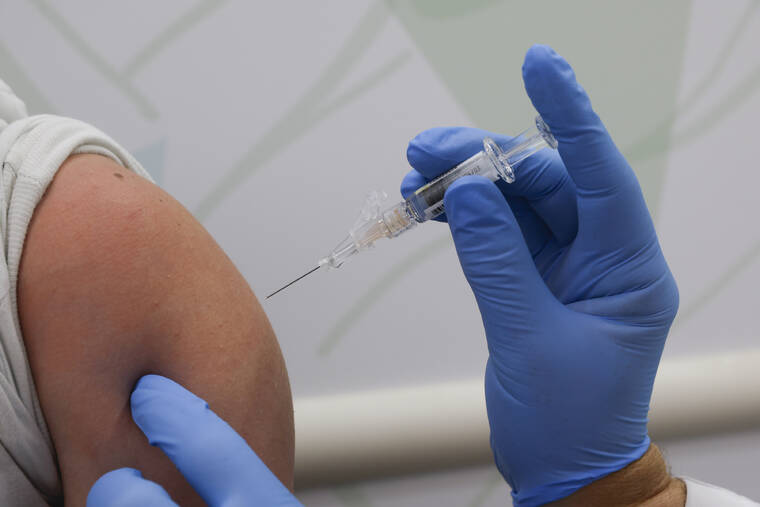
Hawaii has proactively released its own vaccine recommendations for the upcoming respiratory virus season, ahead of anticipated federal guidelines expected to differ significantly. The Hawaii Department of Health announced these recommendations on Wednesday, in collaboration with the West Coast Health Alliance, which includes California, Washington, and Oregon. This decision comes as a federal advisory committee prepares to review vaccine protocols for COVID-19, influenza, and respiratory syncytial virus (RSV) over the next two days.
The recommendations advocate for the COVID-19 vaccine for all children aged 6 to 23 months and pregnant women, alongside a suggestion for all children and adults who desire vaccination. Influenza vaccinations are recommended for nearly all individuals, while RSV vaccines are specifically advised for infants and older adults. In a joint statement, the four state governors, including Gov. Josh Green, emphasized their commitment to prioritizing science, safety, and transparency in public health.
“Our states are united in putting science, safety, and transparency first — and in protecting families with clear, credible vaccine guidance,” they stated. The alliance’s recommendations draw upon insights from reputable national medical organizations, including the American Academy of Pediatrics and the American College of Obstetricians and Gynecologists.
Hawaii’s largest insurance provider, HMSA, confirmed that it would continue to cover COVID-19 vaccines at no cost for individuals aged six months and older. Similarly, Kaiser Permanente announced that COVID vaccines are available at no charge for its members.
The timing of these recommendations coincides with significant changes within federal health agencies. U.S. Health Secretary Robert F. Kennedy Jr. has made headlines this summer for controversial decisions, including the dismissal of the entire CDC Advisory Committee on Immunization Practices (ACIP). Kennedy’s actions, which included announcing via social media that COVID-19 vaccines were no longer recommended for pregnant women and healthy children, have sparked widespread concern and criticism.
In response, Andrew Nixon, a spokesman for the U.S. Department of Health and Human Services, stated that the integrity of public health agencies has been undermined by the actions of “Democrat-run states” during the COVID-19 pandemic. Nixon emphasized that ACIP remains the authoritative scientific body for immunization recommendations, asserting that policy decisions will be based on rigorous scientific evidence.
The West Coast Health Alliance has positioned its recommendations as a counteraction to the perceived politicization of health guidance during the previous administration. They advocate for equitable access to essential vaccinations for all residents across their states.
Dr. Kenneth Fink, Director of the Hawaii Department of Health, reiterated the critical role of vaccines in protecting against severe illness from respiratory viruses. He stated, “Seasonal immunization is a vital public health tool to reduce community transmission and alleviate pressure on the healthcare system.” The recommendations highlight groups most at risk for complications, including young children, older adults, pregnant individuals, and those living in congregate settings.
In a bid to ensure widespread access, the Department of Health strongly encourages health insurers to maintain coverage for these vital immunizations without costs to patients. The alliance’s recommendations lay out specific guidance for various demographic groups:
Vaccine Recommendations for 2025-2026
COVID-19
– Children: All children aged 6 to 23 months and those 2 to 18 years with risk factors or who have never been vaccinated.
– Pregnancy: All individuals planning pregnancy, pregnant, postpartum, or lactating.
– Adults: All individuals 65 years and older, younger adults with risk factors, and those in close contact with at-risk individuals.
Influenza
– Children: All individuals aged 6 months and older.
– Pregnancy: All individuals planning pregnancy, pregnant, postpartum, or lactating.
– Adults: General recommendation for all.
RSV
– Children: All infants younger than 8 months and those 8 to 19 months with risk factors.
– Pregnancy: Recommended for individuals at 32-36 weeks gestational age.
– Adults: All individuals aged 75 years and older and those aged 50 to 74 with risk factors.
As the ACIP prepares to review various vaccines, including those for measles, mumps, rubella, and varicella, the alliance remains steadfast in its mission to provide transparent and science-based vaccination guidance.
In a related note, the insurance trade group America’s Health Insurance Plans has announced that its members will continue to cover updated COVID-19 and influenza vaccines recommended as of September 1 through the end of 2026, ensuring ongoing support for public health initiatives.






